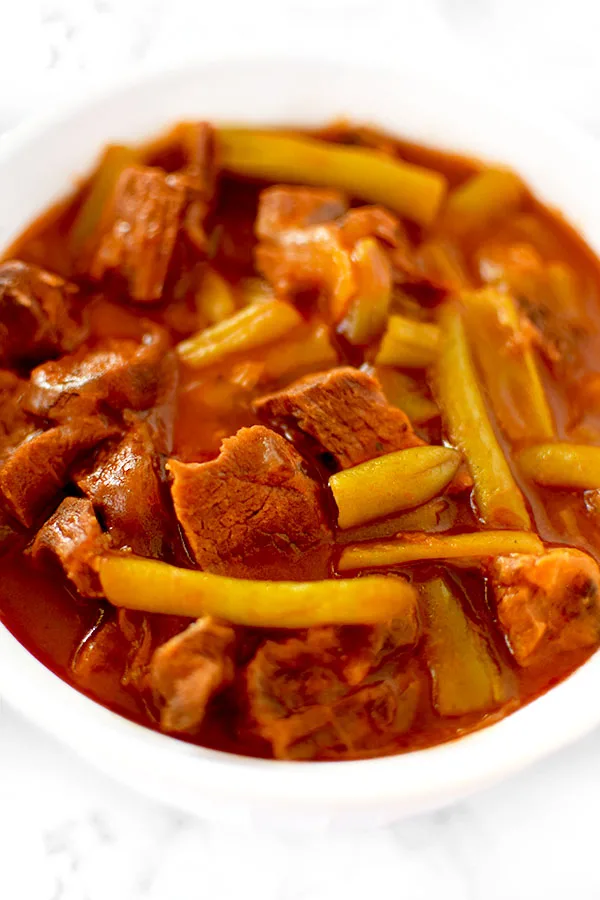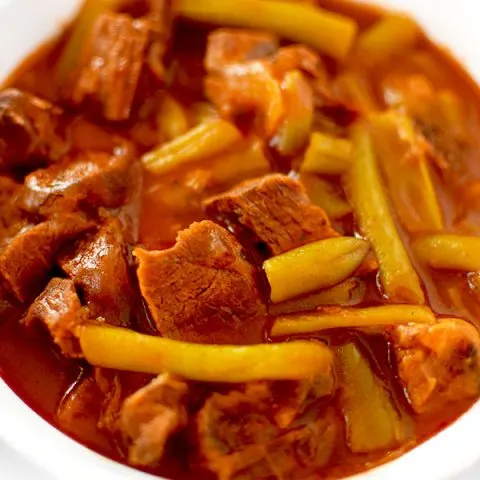Lebanese Beef and Green Beans is a tasty and easy dish. At its simplest, it is meat cooked with green beans in a seasoned tomato sauce. Serve with a side of rice for a healthy and well rounded meal!

This dish was brought to Israel by Jewish immigrants from Lebanon.
Growing up, my mom made American food during the week and Israeli food on Shabbos.
This is in large part due to a visit from my Israeli-Syrian grandmother when I was four.
During her trip she taught my mother a number of Israeli dishes which my family eats regularly to this day.
One of them is this Lebanese Beef and Green Beans recipe and another is Israeli roasted paprika potatoes.
I say she is Israeli-Syrian because her parents moved from Aleppo to Jerusalem before she was born.
My grandmother was the first generation in her family to be born in Israel.
Despite being raised in a Syrian household, her cooking was very Israeli.
In fact, I'm not sure if she knows how to make a single Syrian dish.
Serve with Israeli white rice, Israeli yellow rice, or Israeli red rice.
Even Simpler
My family, or at least my mom, keeps this recipe insanely simple.
She only uses meat, green beans, and chicken bullion powder.
In my book, anything else is optional.
You can feel free to use frozen green beans and canned tomatoes if you want to.
If you don’t have shoulder roast, you can use any meat you have on hand.
Just make sure you don’t overcook tender meat, making it tough, or under-cook tough meat, also leaving it tough.
What to serve it with
I like to serve meat with mashed potatoes. However, mashed potatoes isn't extremely common in Israel.
So, for an authentic meal, serve it with Israeli White Rice, Israeli Yellow Rice, or Israeli Red Rice.
Israeli Red Rice is much less common.
IS KOSHER Meat BETTER?
Kosher animals are kept in better conditions than non-kosher animals due to strict kosher health requirements of the animals.
Also, the salting process used as part of the process of making meat kosher is similar to dry brining, and therefore produces a better quality meat.
While I’ve only eaten kosher meat and so I cannot compare, I’ve been told by non-Jews who do not keep kosher that they’ve noticed that kosher meat is of superior quality to cook with.
SHOULD YOU WASH Meat?
According to the USDA, you should not wash meat or poultry because water can splash bacteria up to 3 feet surrounding your sink.
A study done by Drexel University shows that it is best to move meat and poultry directly from package to pan. The heat from cooking will get rid any bacteria that may be present.
HOW CAN I CLEAN MY meat WITHOUT WASHING IT?
If you want to clean your meat without washing it, wipe it down with a wet paper towel.
Just make sure the paper towel doesn't touch anything else and to toss the paper towel right away.
HOW TO DEFROST Meat
IN THE FRIDGE
Defrosting meat in the fridge is the most highly recommended.
To do this, place the frozen meat in a pan and let it thaw. Oftentimes when meat thaws, it releases liquids that can leak onto your fridge, so the pan is really helpful.
Meat typically takes a full day to thaw. Once thawed, it can remain in the refrigerator for a day or two before cooking.
IN COLD WATER
Defrosting meat in water should take two to three hours.
Submerge your sealed meat in a pot or bowl full of cold water. Change out the water every 30 minutes or so.
Do not use hot water because it can start cooking your meat.
Can you cook FROZEN meat?
According to the USDA, you can cook frozen meat. It will take 50% longer to cook, but it’s an option.
You should also cook it on a roasting rack or over vegetables so that the heat can circulate around the meat.
IS IT SAFE TO REFREEZE RAW meat?
According to the USDA, “food thawed in the refrigerator is safe to refreeze without cooking.” However, you do lose quality when refreezing previously defrosted meat.
Every time you defrost meat, it loses moisture as it thaws, which also leads to a loss in flavor. To compensate for this, marinate the meat to add more flavor and juice.
The USDA also says not to “refreeze any foods left outside the refrigerator longer than 2 hours; 1 hour in temperatures above 90°F.”
SHOULD YOU BRINE meat?
Brining actually doesn’t do anything to help meat. In fact, it makes it soggy rather than juicy, with watered-down flavor.
Aromatic brines and stock don’t help with flavor either. This is because the salt pulls water molecules in, leaving most of the flavor behind.
DRY BRINING
A dry brine, on the other hand, loosens up muscle fibers, allowing them to retain more moisture without adding any excess liquid.
Initially, the salt draws moisture out, then it dissolves in this liquid, creating a concentrated brine, which eventually gets reabsorbed. This leads to more intensely flavored results.
An added benefit is that it also requires less space and mess than a water brine. Not to mention the fact that it allows for crispier skin.
CAN YOU DRY BRINE KOSHER MEAT?
Food experts are often under the impression that kosher meat and poultry cannot be brined or dry brined.
This is because of the koshering process, which involves salting the meat. However, the process is not nearly as long as the dry brining process, and unlike a dry brine, the meat is soaked to remove the salt.
So, since the process is different than a dry brine, it is fine and even recommended to dry brine kosher poultry and meat.
How do you dry brine meat?
Begin by patting the meat with paper towels. This will help the salt adhere to the meat.
Grab pinches of kosher salt and sprinkle it over the meat until the meat is generously salted and evenly coated.
Place the dry-brined meat on a rack or a plate and refrigerate it. Refrigerate meat for 45 minutes to 48 hours.
Once the waiting period is up, there is no need to rinse off the meat. Just cook it as usual.
HOW TO STORE MEAT
Once cooled, place in an airtight container and refrigerate. Store for 3 to 4 days.
HOW TO FREEZE MEAT
Freeze leftovers within 3-4 days. Place in an airtight container or resealable freezer bag.
Freeze for up to 6 months. After that, it is still safe to eat but the quality begins to degrade.
Beef and Green Beans

Beef and green beans is an easy and healthy dish. Serve with rice.
Ingredients
- 1 pounds shoulder roast (450 grams), cubed
- 2 ½ tablespoons tomato paste
- water
- 1 medium onion, diced, optional
- 3 cloves garlic, sliced, optional
- 1 pound green beans (450 grams)
- chicken bouillon powder
Instructions
- Place meat in a pot with enough water to cover it and add tomato paste. You can also add the garlic and onions if you so desire.
- Bring to a boil, then lower to a simmer and cook for 30 to 60 minutes or until the meat is tender. The length of time will depend on the size of your meat cubes.
- Add the green beans to the pot and chicken bouillon powder to taste. Simmer until the green beans are fully cooked.
Notes
If you are using frozen green beans, defrost first and simmer only for five to ten minutes so it soaks in the flavors.
Nutrition Information:
Yield:
4Serving Size:
1Amount Per Serving: Calories: 451Total Fat: 25gSaturated Fat: 10gTrans Fat: 0gUnsaturated Fat: 12gCholesterol: 156mgSodium: 82mgCarbohydrates: 14gFiber: 4gSugar: 6gProtein: 42g
Tony Brice
Sunday 23rd of May 2021
My Mom was Syrian and she used to make this dish with leftover roast beef only she used potatoes instead of rice adding them into the sauce with the roast beef and green beans. So Delicious
ElissaBeth
Tuesday 25th of May 2021
Sounds yummy! I'm going to have to try that one day :)